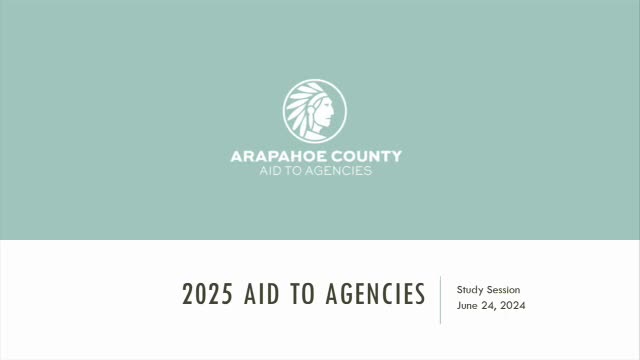Funding Crisis Forces Tough Choices for County Aid Programs
June 24, 2024 | Arapahoe County, Colorado

This article was created by AI summarizing key points discussed. AI makes mistakes, so for full details and context, please refer to the video of the full meeting. Please report any errors so we can fix them. Report an error »

During a recent government meeting, officials continued discussions regarding funding for various agencies, focusing on the aid to agencies program. This session followed up on a previous meeting held on June 3rd, where the need for financial support for essential services was highlighted.
Daniella, a key presenter, provided an overview of the safety net program, which was established in 2021 to support organizations that deliver critical services without requiring formal applications for funding. The funding is subject to annual approval and can fluctuate based on board decisions. Notably, three organizations—Tri Valley Seniors, Gateway Domestic Violence, and Aurora Mental Health Center Detox—were identified as sole providers of specific services in their areas, underscoring their importance to the community.
The meeting also addressed the competitive grant program, where organizations must apply for funding. In 2023, 51 applications were submitted, totaling over $2 million in requests, but only $500,000 was available for distribution. This disparity highlights the ongoing challenge of meeting community needs with limited resources.
Looking ahead to the 2025 budget, officials anticipate a significant shortfall, with projections indicating a $4.2 million decrease compared to the 2024 budget. This situation has prompted discussions about potential funding cuts and the sustainability of the aid to agencies program. Options considered included completely cutting program funding, partially funding at 50% or 35%, or maintaining the current funding levels, which would require cuts in other areas.
The aid to agencies committee recommended either a 50% or 35% funding option, contingent on any new revenue that may arise. The commissioners expressed the difficulty of the decision-making process, acknowledging the need to balance community support with fiscal realities. Commissioner Baker emphasized the importance of these programs and the responsibility of elected officials to make tough choices.
As the meeting concluded, the commissioners were tasked with deciding on the funding approach for the upcoming year, with a consensus leaning towards the partial funding options to ensure continued support for essential services while navigating budget constraints.
Daniella, a key presenter, provided an overview of the safety net program, which was established in 2021 to support organizations that deliver critical services without requiring formal applications for funding. The funding is subject to annual approval and can fluctuate based on board decisions. Notably, three organizations—Tri Valley Seniors, Gateway Domestic Violence, and Aurora Mental Health Center Detox—were identified as sole providers of specific services in their areas, underscoring their importance to the community.
The meeting also addressed the competitive grant program, where organizations must apply for funding. In 2023, 51 applications were submitted, totaling over $2 million in requests, but only $500,000 was available for distribution. This disparity highlights the ongoing challenge of meeting community needs with limited resources.
Looking ahead to the 2025 budget, officials anticipate a significant shortfall, with projections indicating a $4.2 million decrease compared to the 2024 budget. This situation has prompted discussions about potential funding cuts and the sustainability of the aid to agencies program. Options considered included completely cutting program funding, partially funding at 50% or 35%, or maintaining the current funding levels, which would require cuts in other areas.
The aid to agencies committee recommended either a 50% or 35% funding option, contingent on any new revenue that may arise. The commissioners expressed the difficulty of the decision-making process, acknowledging the need to balance community support with fiscal realities. Commissioner Baker emphasized the importance of these programs and the responsibility of elected officials to make tough choices.
As the meeting concluded, the commissioners were tasked with deciding on the funding approach for the upcoming year, with a consensus leaning towards the partial funding options to ensure continued support for essential services while navigating budget constraints.
View full meeting
This article is based on a recent meeting—watch the full video and explore the complete transcript for deeper insights into the discussion.
View full meeting
